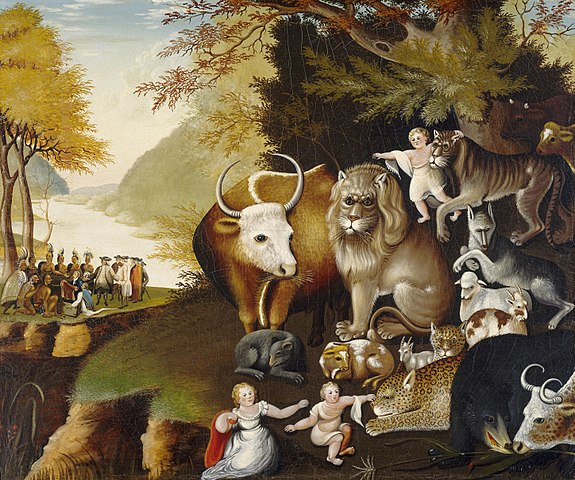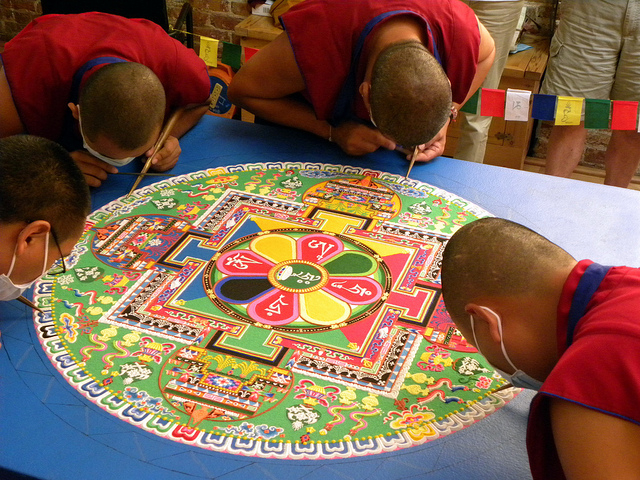Language and history often go hand in hand. The words we use – or don’t use – often contain fascinating stories within them that carry a good deal of meaning beyond the dictionary definition. Here are a few – feel free to add some of your own in the comments!

Martin Luther King, Jr., US civil rights leader and proponent of non-violent resistance, gives his famous ‘I have a dream’ speech in 1963, cheered on by supporters in Gandhi caps (still from this video)
1. Ahimsa
This Sanskrit word literally means ‘without injury’. In English, it refers to the doctrine of non-violence, a defining characteristic of India’s freedom struggle led by Mahatma Gandhi, and later, of the civil rights struggle in the US led by Martin Luther King, Jr. The earliest known references to the word in English date back to well before Gandhi’s political activism. Oxford University professor of Sanskrit Monier Monier-Williams mentioned it in his 1875 book Indian Wisdom. In 1936, British author Aldous Huxley wrote in Eyeless in Gaza, “How foolish of Satan to tempt a, by definition, ahimsa-practising Messiah with fame, dominion, ambition.”

The banyan at Howrah Botanical Gardens in Kolkata has a canopy of some 1.5 hectares and nearly 3,000 prop roots (photo by McKay Savage, used under CC license)
2. Banyan
This is the common English name for India’s national tree, which many Hindus regard as a symbol of knowledge. The name is derived from the word bania, meaning trader. The banyan (Ficus benghalensis) is one of several “strangler fig” species, which grow on host trees and sometimes kill them. Older banyans have aerial prop roots that grow down and become “trunks”, extending the canopy across a wide area.
The wide canopy makes this tree a great meeting place, and the name banyan was given to it by Europeans who observed Gujarati merchants gather under one such tree in a Persian Gulf town. In 1634, the English traveler Thomas Herbert wrote in his book Some Yeares Travels into Africa and Asia the Great: “A Tree (or rather twenty Trees, the boughs rooting and springing up a whole aker together) named by us the Bannyan Tree, from their adorning and adoring it with ribbons and streamers of varicoloured Taffata.”

Tibetan Buddhist temple in Rio Grande do Sul, Brazil (photo by Eder Santos, used under CC license)
3. Dharma
This word comes from Sanskrit, and means decree, custom, or righteous behavior. In the context of Buddhism and Hinduism, it can refer to moral law. The first known English reference is from 1796, by William Jones, the British lawyer and scholar who knew not only English and Welsh, but also Sanskrit, Persian, Greek, Latin, Hebrew, Arabic, and some Chinese. Jones referred to it in Institutes of Hindu Law, noting that “Dhermasastra” was in a collective sense a “Body of Law”.
In 1958, American writer Jack Kerouac published his novel The Dharma Bums, exploring the duality of his life of urban hedonism and trekking the great outdoors. Kerouac was influenced by Buddhism, and his novel in turn influenced the hippie counterculture of the 1960s. In it Kerouac wrote, “I really believed in the reality of charity and kindness and humility and zeal and neutral tranquility and wisdom and ecstasy, and I believed that I was an oldtime bhikku in modern clothes wandering the world (usually the immense triangular arc of New York to Mexico City to San Francisco) in order to turn the wheel of the True Meaning, or Dharma…”

The Hindu deities Baldev, Subhadra, and Jagannath (photo by Hary Das Cuellar, used under CC license)
4. Juggernaut
In Sanskrit, jagat means world, and nath means lord. Some Hindus consider the deity Jagannath a representation of Kṛishṇa, an avatar of Vishṇu, while others regard him as a form of Shiva. Some Buddhists and Jains revere Jagannath too. Once a year, the three idols of the Jagannath temple in Puri, Odisha, are placed on massive, ornate wooden chariots and taken through the town streets. In 1321, Italian friar and explorer Odorico Mattiuzzi visited Puri and wrote perhaps the earliest western account of the chariot festival.
In the 1820s, historian Andrew Stirling referred to “That excess of fanaticism which formerly prompted the pilgrims to court death by throwing themselves in crowds under the wheels of the car of Jagannáth”, and added that the practice had “happily long ceased”. In 1827, English lawyer and theological writer John Poynder noted, “About the year 1790, no fewer than twenty-eight Hindoos were crushed to death under the wheels of Juggernaut.” As a result of such accounts, the English word “juggernaut” came to mean an overwhelming force. Thus, for example in 1878, American inventor and businessman Thomas Edison referred to “that remorseless Juggernaut, the needs of man”.

One of the ‘Peaceable Kingdom’ series of paintings by American artist Edward Hicks. A Pennsylvania Quaker, Hicks was influenced by his faith’s concept of ‘the Inner Light’ (the divine within us) and depicted humans and animals overcoming barriers and coexisting in peace.
5. Love
OK, strictly speaking, this word is not India’s gift to English, but rather, the shared heritage of many languages around the world. ‘Love’ comes from the Old English word lufu, which is of Germanic origin and comes from an Indo-European root that is shared with the Sanskrit verb lubhyati (desires), and Latin libet (‘it is pleasing’) and libido (‘desire’).

Buddhist monks create a sand mandala (image by S C Hargis, used under CC license)
6. Mandala
This Sanskrit word meaning ‘disc’ or ‘circle’ usually refers to a symbolic representation of the universe in some Hindu and Buddhist traditions. The German philologist Max Müller referred to it in 1859 in his A History of Ancient Sanskrit Literature. Swiss psychologist Carl Jung was keenly interested in Asian religions, and visited India in 1937. The following year, he wrote in Psychology and Religion, “Historically the mandala served as a symbol in order to clarify the nature of the deity philosophically.” In Jungian psychology, a similar circle visualized in dreams can be interpreted as symbolizing the dreamer’s striving for unity of self and completeness.

Zen Mountain Monastery in Mount Tremper, New York
7. Zen
This Japanese word comes from the Chinese chan, meaning quietude, which in turn comes from the Sanskrit dhyaana, meaning meditation. A school of Mahayana Buddhism that emphasized meditation and personal awareness became influential in Japan from the 13th century, after being introduced via China. The word appeared in English in 1727 in The History of Japan: together with a description of the Kingdom of Siam, 1690-92, a translation of the writings of German explorer and writer Engelbert Kaempfer by the Swiss scholar Johann Caspar Scheuchzer.
By Uma Asher
For more language-related posts, click below!
An English-speaker’s guide to funny Americanisms
Everyone speaks Farsi
6 easy tricks to pronounce Italian words correctly
Paneer, cottage cheese, and the vocabulary of diversity
5 words to help you brag about your beautiful campus






















